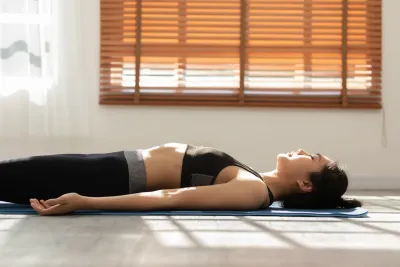
Key Takeaways
Meditation and yoga offer simple, effective ways to manage holiday stress and support both mental and physical well-being.
- Meditation and yoga are proven tools for reducing holiday stress, calming the mind, and restoring emotional balance.
- Mindful movement and focused breathing help regulate the nervous system, easing anxiety and improving mood.
- Even short daily practices—just a few minutes of yoga poses or breathing exercises—can deliver noticeable stress relief.
- Making time for mindfulness supports better sleep, steadier energy, and resilience during busy holiday schedules.
- Prioritizing mental health during the holidays is important, and seeking additional support when stress feels overwhelming is a healthy step.
Turn on the TV during the holidays and you’re guaranteed to see it all — families laughing in the snow, perfectly roasted dinners, cheerful shoppers gliding through stores like it’s nothing. Some of these moments make you laugh, and some might even put a tear in your eye. But they don’t always match the reality most of us are living.
For many people, the holidays come with pressure, realistic expectations, and one of the biggest stress spikes of the year. That’s why understanding how to manage that stress matters — and why yoga and meditation can make a real difference. We’re here to show you how these practices can help you stay grounded, calm, and managing holiday stress during the busiest season of all.
Before we get into the solutions, let’s take a look at the most common holiday stress triggers.
Take the Pressure Off Your Holidays
Ready to feel calmer this season? Pair your meditation and yoga routine with the perfect sleep temperature—set your current bed to any temperature you love, from a crisp 55°F to a cozy 115°F.
What Causes Holiday Stress?
Ever wonder why the holidays feel so stressful? You’re not imagining it. A 2023 American Psychological Association survey found that 41 percent of people feel more stressed during the season, which says a lot. [1]
Another study showed nearly the same results: 44 percent feel stressed, and almost 20 percent say their stress increases even more this time of year. It’s completely normal to feel the pressure, and for some, the holidays can be especially challenging. [2]
According to a 2021 survey, people shared a long list of holiday stressors. Do you fall into one of these categories?
- Shopping for gifts - 26%
- Managing children’s excitement - 17%
- Navigating family dynamics - 17%
- Supply chain issues - 14% [3]
The same survey revealed people dealt with stress in 2021 by:
- Eating comfort food - 19%
- Drinking alcohol - 14% [4]
Related: Want to keep your energy up and stress down this season? Click to read our Holiday Wellness Guide and make it through the holidays feeling your best.
Finding Your Calm in the Chaos
Holiday stress piles up fast — shopping, family plans, kids’ schedules, and everything in between. It’s a lot, and it’s completely normal to feel overwhelmed.
The best way to stay steady is to plan ahead. Spot the stressors that usually get to you and decide how you want to handle them before they hit. Sharing responsibilities, like gift shopping and cooking, can help reduce individual burdens during the holiday season.
Keep your routines close and your boundaries firm. Make space for rest, pay attention to how you’re feeling, and step back when you need to. A few intentional choices can make the season feel lighter and far more manageable.
Stick to your self-care routines and boundaries to maintain consistency and protect your well-being. Watch for signs of increasing stress and take action as needed to support your emotional health.
Experiment with Breathing Exercises
Keeping a positive outlook during the holidays isn’t just good for your mood — it can help your body, too. On the flip side, staying stuck in anger or frustration can take a real toll, contributing to issues like lower lung function, heart problems, and even stroke. A calmer mindset truly supports your overall health.
Adults should aim for enough sleep, specifically seven to nine hours per night, to maintain stamina and reduce the unwanted stress this holiday season. Keeping the same sleep schedule during the week makes a bigger difference than most people realize. It helps your stress stay in check and gives your mind the steady rhythm it needs to feel balanced.
According to Johns Hopkins, forgiving others, including your relatives from out of town, can improve your health and help you breathe better. [5] Breathing exercises can help increase oxygen levels and rid your lungs of stale air. [6]
Give Box Breathing Exercise a Try
Breathing exercises can also help relieve stress, including box breathing.
Box breathing exercise is also referred to as square breathing, box breathing is a deep breathing exercise commonly used to help slow down your breathing and is a powerful stress reliever. How does it work? It distracts your mind as you count. By counting, it can calm your nervous system and decrease your body's stress level.
Exercise Tip: As you practice box breathing, listen to your body and mind, noticing any changes in your stress levels or sense of relaxation.
Box breathing is one of those surprisingly simple tricks that actually works. It’s just slow, steady breathing, but it can calm your nerves, ease stress, and even lift your mood when things start feeling chaotic.
Read More: Sleep and Stress Management: Strategies for a Calm Mind

Let Yoga Exercises Help You
Yoga might not be the first thing you think of after pulling a hot casserole out of the oven, but it can be a surprisingly comforting way to slow down and breathe again. It helps your body relax, eases stress, and gives your mind a minute to reset — which is priceless during the holiday rush.
And if you try it outdoors, the fresh air can make it even more calming. Not sure it’s your thing? You might be surprised how good it feels.
How to Get Started With Yoga
If you’ve been thinking about trying yoga during the holidays, the good news is it’s easier to fit in than you might think. You don’t need a studio, special gear, or a huge chunk of quiet time — just a few minutes and a little space.
Start with beginner-friendly routines. These help you learn the basic poses, get comfortable with the movements, and build the strength and balance you’ll need if you ever want to try more advanced stuff later. You can roll out a mat in your bedroom before everyone wakes up, sneak in a short video session while the family is glued to a holiday movie, or step outside for a quick stretch when you need a break from the noise.
Even a few minutes a day can take the edge off holiday stress and help you stay grounded, focused, and more like yourself — both physically and mentally.
Read More: How to Get Started with Yoga
The Practice of Yoga Nidra
If you’re new to Yoga Nidra, think of it as a guided meditation that feels a bit like drifting into the edge of sleep — calm, warm, and deeply relaxing. You simply lie down, breathe slowly, and listen as you’re guided through the practice. There’s no right or wrong way to feel; you just notice whatever comes up.
It’s a gentle way to let your body rest and your mind settle, almost like giving yourself a mental reset without fully falling asleep. Many people use it to unwind, release tension, and find a sense of quiet they don’t get anywhere else.
Understanding the Differences: Yoga Nidra vs. Meditation
While the primary goal of meditation and Yoga Nidra are alike, both methods work to develop a heightened sense of awareness. With meditation, you are traditionally seated, while Yoga Nidra is always practiced laying down.
Though some people lump them together, they're two different practices. With Yoga Nidra, the primary goal is to move into a deep state of consciousness, awareness sleep, and a deeper state of relaxation with awareness.
Regarding meditation, the individual is sitting in a waking state of consciousness while focusing the mind and allowing ideas to come and go freely. Meditation is about training in awareness and gaining a healthy sense of perspective.
Slow Down with Meditation
When the holiday stress starts stacking up — family plans, shopping, nonstop to-do lists — meditation can give you a much-needed breather. It helps you slow down, clear your head, and get back to what actually matters to you this season.
It can also help you tap into a little more joy, making it easier to prioritize the moments that feel meaningful instead of just powering through the chaos and unexpected excitement.
Read More: Meditation Can Improve Your Sleep
How to Get Started with Meditation
If you’re new to meditation, keep it simple. Sit somewhere comfortable, close your eyes, and pay attention to your breathing — in, out, nice and steady. Then try slowing each breath a little. That alone can calm your body and quiet your mind. If you want, you can also focus on a candle or an object to help you stay centered.
A sudden wave of loneliness tends to sneak in. And don’t worry about doing it “right.” There are plenty of styles to try, so choose whatever feels comfortable and helps you stay grounded during the season.
Mindfulness Meditation
You may then want to practice mindfulness. Try keeping your eyes closed as you aim to calm and empty your mind, noticing thoughts when they appear and gently allowing them to float away.
You notice and pay attention to your thoughts and observations without judgment while practicing mindfulness meditation. It can be an effective way to manage feelings of stress, anxiety, and frustration during stressful holiday moments, while helping with relaxation. This practice combines awareness and concentration and can be done alone.
Additionally, mindfulness meditation appears to help improve your sleep quality. [7]
Let Yourself Laugh
Despite the neighbor’s Christmas lights, the overcooked dinner, and your snug sweater, laughing about it all will reduce stress and anxiety. Spending quality time with family and friends can help alleviate stress during the holidays.
You can make holiday activities fun and enjoyable. This is important for creating positive memories with either family or friends.
Did You Know: Spending time with loved ones and involving a family member can strengthen your support system and bring comfort. Participating in holiday events also provides opportunities for connection and joy.
There are plenty of benefits of laughter, including:
- Relieves your stress response
- Reduces the physical symptoms of stress
- Helps you connect with others
- Improves your mood [8]
Conclusion
Getting caught up in the holiday grind is easy, but feeling emotionally drained before, during, and after only ensures that you'll start the new year feeling the same way.
Before the calendar turns to a new year, it's more important to reflect on the past year's successes, and use that as an opportunity to map out goals for the next 12 months.
Frequently asked questions
What Makes the Holidays So Stressful?
The holiday season often brings a whirlwind of expectations, from family obligations and financial strain to packed schedules and disrupted routines—all of which can take a toll on mental and physical health.
How Does Meditation Help With Holiday Stress?
Meditation encourages mindfulness, reduces cortisol levels, and calms the nervous system—helping you stay grounded when life gets chaotic.
What Are Easy Ways to Incorporate Meditation and Yoga Into a Busy Holiday Schedule?
- Start your morning with a 5-minute guided meditation
- Try a gentle yoga flow before bed
- Use deep breathing exercises during high-stress moments
- Take movement breaks between holiday errands
- Join virtual or local classes to stay motivated
How Do I Get Rid of Holiday Stress?
To shake off holiday stress, think less hustle, more mindful muscle. Meditation can help reset your nervous system, yoga releases physical tension, and setting boundaries keeps burnout at bay. Prioritize sleep, say no when you need to, and don’t underestimate the power of a quiet moment with your breath. Your peace of mind is worth protecting—even during the most chaotic season.
Peer-Reviewed Research References
-
American Psychological Association (APA).
Even a Joyous Holiday Season Can Cause Stress for Most Americans.
Source Type: National Psychological Association Report
Key Insight: Reports that the majority of Americans experience heightened stress during the holidays due to financial pressure, family expectations, and disrupted routines.
View Resource
Source URL: https://www.apa.org/news/press/releases/2023/11/holiday-season-stress
-
Moss, J.
Holidays Can Be Stressful. They Don’t Have to Stress Out Your Team.
Harvard Business Review, 2018.
Source Type: Workplace Psychology & Leadership Analysis
Key Insight: Explores how workload expectations, time pressure, and lack of boundaries during the holidays contribute to stress—and how leaders can mitigate burnout through flexibility and planning.
View Resource
Source URL: https://hbr.org/2018/12/holidays-can-be-stressful-they-dont-have-to-stress-out-your-team
-
Psychiatry.org.
Americans Are More Anxious Than Last Year About the Upcoming Holidays.
American Psychiatric Association, 2025.
Source Type: National Mental Health Survey Report
Key Insight: Indicates rising holiday-related anxiety driven by economic concerns, healthcare costs, and social pressure, with stress frequently impacting sleep quality and emotional wellbeing.
View Resource
Source URL: https://www.psychiatry.org/News-room/News-Releases/Americans-More-Anxious-About-the-Holidays
-
Ibid.
Source Type: Continuation of Prior Source
Key Insight: Reinforces that sustained anxiety during the holiday season contributes to sleep disruption, emotional fatigue, and reduced resilience.
Refers to American Psychiatric Association (2025).
-
Johns Hopkins Medicine.
Forgiveness: Your Health Depends on It. 2025.
Source Type: Medical Authority Guidance
Key Insight: Highlights how forgiveness and emotional release reduce stress hormones, improve heart health, and support better sleep quality.
View Resource
Source URL: https://www.hopkinsmedicine.org/health/wellness-and-prevention/forgiveness-your-health-depends-on-it
-
American Lung Association.
Breathing Exercises. 2021.
Source Type: Clinical Respiratory Health Guidance
Key Insight: Demonstrates how controlled breathing exercises calm the nervous system, reduce stress, and support relaxation before sleep.
View Resource
Source URL: https://www.lung.org/lung-health-diseases/wellness/breathing-exercises
-
Barrett, B., et al.
Mindfulness Meditation and Exercise Both Improve Sleep Quality.
Sleep Health, 2020.
Study Type: Randomized Controlled Trial (Secondary Analysis)
Key Finding: Found that both mindfulness meditation and regular exercise significantly improved sleep quality, reduced insomnia symptoms, and lowered perceived stress in adults.
View Study
Source URL: https://pubmed.ncbi.nlm.nih.gov/32425206/
-
Mayo Clinic Staff.
Stress Relief From Laughter? It’s No Joke.
Mayo Clinic, 2021.
Source Type: Medical Wellness Guidance
Key Insight: Explains how laughter lowers cortisol, relaxes muscles, and improves mood—benefits that can support better sleep and stress recovery.
View Resource
Source URL: https://www.mayoclinic.org/healthy-lifestyle/stress-management/in-depth/stress-relievers/art-20047257









